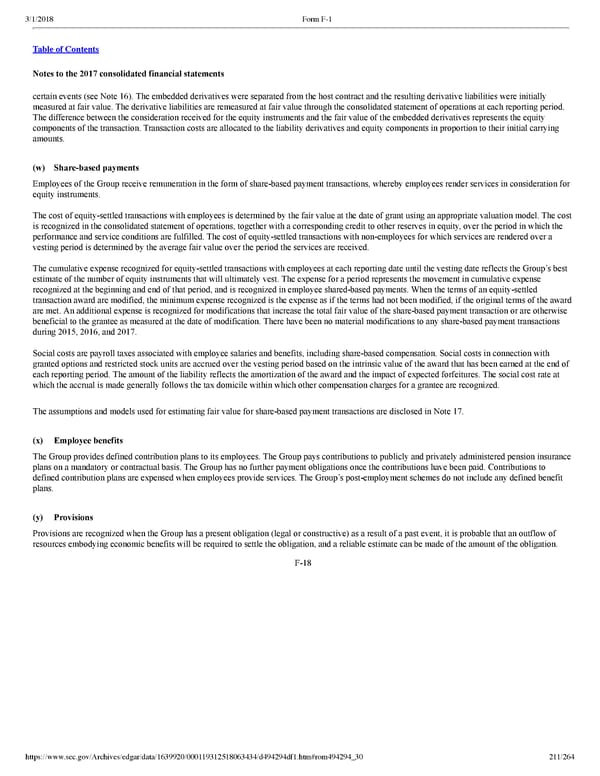211/264 Notes to the 2017 consolidated financial statements certain events (see Note 16). The embedded derivatives were separated from the host contract and the resulting derivative liabilities were initially measured at fair value. The derivative liabilities are remeasured at fair value through the consolidated statement of operations at each reporting period. The difference between the consideration received for the equity instruments and the fair value of the embedded derivatives represents the equity components of the transaction. Transaction costs are allocated to the liability derivatives and equity components in proportion to their initial carrying amounts. (w) Sharebased payments Employees of the Group receive remuneration in the form of sharebased payment transactions, whereby employees render services in consideration for equity instruments. The cost of equitysettled transactions with employees is determined by the fair value at the date of grant using an appropriate valuation model. The cost is recognized in the consolidated statement of operations, together with a corresponding credit to other reserves in equity, over the period in which the performance and service conditions are fulfilled. The cost of equitysettled transactions with nonemployees for which services are rendered over a vesting period is determined by the average fair value over the period the services are received. The cumulative expense recognized for equitysettled transactions with employees at each reporting date until the vesting date reflects the Group’s best estimate of the number of equity instruments that will ultimately vest. The expense for a period represents the movement in cumulative expense recognized at the beginning and end of that period, and is recognized in employee sharedbased payments. When the terms of an equitysettled transaction award are modified, the minimum expense recognized is the expense as if the terms had not been modified, if the original terms of the award are met. An additional expense is recognized for modifications that increase the total fair value of the sharebased payment transaction or are otherwise beneficial to the grantee as measured at the date of modification. There have been no material modifications to any sharebased payment transactions during 2015, 2016, and 2017. Social costs are payroll taxes associated with employee salaries and benefits, including sharebased compensation. Social costs in connection with granted options and restricted stock units are accrued over the vesting period based on the intrinsic value of the award that has been earned at the end of each reporting period. The amount of the liability reflects the amortization of the award and the impact of expected forfeitures. The social cost rate at which the accrual is made generally follows the tax domicile within which other compensation charges for a grantee are recognized. The assumptions and models used for estimating fair value for sharebased payment transactions are disclosed in Note 17. (x) Employee benefits The Group provides defined contribution plans to its employees. The Group pays contributions to publicly and privately administered pension insurance plans on a mandatory or contractual basis. The Group has no further payment obligations once the contributions have been paid. Contributions to defined contribution plans are expensed when employees provide services. The Group’s postemployment schemes do not include any defined benefit plans. (y) Provisions Provisions are recognized when the Group has a present obligation (legal or constructive) as a result of a past event, it is probable that an outflow of resources embodying economic benefits will be required to settle the obligation, and a reliable estimate can be made of the amount of the obligation. F18
 Spotify F1 | Interactive Prospectus Page 210 Page 212
Spotify F1 | Interactive Prospectus Page 210 Page 212